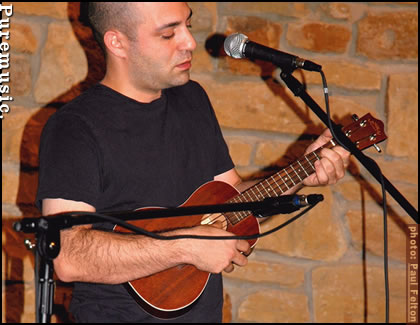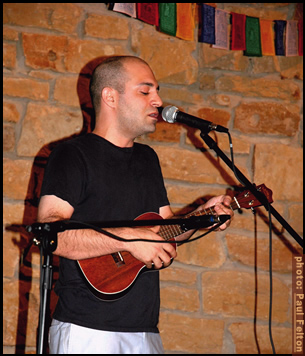
A Conversation with Daniel Tashian
(continued)
PM: So let's talk about the ukulele, because you're a local champion thereof.
DT: Okay. I love to talk about the ukulele, sure.
PM: I recently saw you play solo with a ukulele at that church benefit for the Tibetan Monks, brothers known as the Kempos. And I liked that gig a lot.
DT: Well, thank you for that. I'm still refining some of these ideas. But basically, well, my neighbor is this hit country songwriter. He's had all these hits and cuts and everything. But he has a passion for the ukulele as well. And so we've actually got eight tunes written for a ukulele record.
PM: Who's that? Who is the guy?
DT: His name is Troy Verges.
PM: Oh, Troy Verges, sure. [laughs]
DT: And so it's kind of exciting, because it's been a dream of mine to have a record of songs all written on the ukulele. And he's helping me make that dream come true, because I just don't have the personal fortitude to accomplish it on my own. And a friend of his, a guy named Marv Green--
PM: Oh, another great songwriter, holy shit.
DT: --joined in with this. And actually, the three of us wrote a really great song. This is one of the things about Nashville that I love: you can basically throw a rock from my house and hit somebody who's into the same weird stuff that you're into.
PM: Yeah, it's going to bounce off his head and hit somebody else that's into the same thing, yeah.
DT: And so it's a very productive environment for me, anyway. I can't really imagine anywhere elsewhere you could have that kind of community.
PM: And people don't understand that.
DT: But at the same time, I want to temper that by saying I really don't feel like Music Row has ever really given a whole lot of--I don't know, I just never felt like a really sympathetic vibration from the real sort of ground-level industry here. It's always been these little niches that I've tried to create outside the realm of...
And actually, I rode on a plane with Waylon Jennings shortly before he died, back from Austin. We sat next to each other. He told me, as the plane was literally hitting the ground, he leaned in and he said, "You know, I never did feel like they completely ever accepted me here."
PM: Wow.
DT: And so I don't know at what point of success I'll reach that I'll feel--you still feel a little hurt that the industry isn't more willing to try to--I don't know what they could do, but they're certainly still selling records and certainly still making money, but I'm not on their radar at all.
PM: Even at their best, the musical insiders, the Row, is so shortsighted here, that unless you're doing the very specific thing that they want you to do for them, you are just not on the program.
DT: Uh-huh.
PM: It's just that simple. It's really a shame.
DT: I remember I spent a couple weeks working on two demos where I played all the instruments, and really made these beautiful songs. And then I took them into a publisher, and the guy was like, "No, I think I'd just rather have a guitar vocal."
PM: And if you brought in that, he would have said the other thing. "I can't sell guitar vocals."
DT: But I've decided now to just do my thing and maybe if this record catches fire a little bit and it opens some doors for me, and even if we get the opportunity to make another one, I may not have to suck up to these hillbillies.
PM: Absolutely not. No, I don't think that that's in the cards for you, sucking up to the hillbillies, I don't think that's how it's going to happen.
So about the uke--do you tune it regular tuning, or do you use other tunings? How do you approach it?
DT: I tune it in standard ukulele tuning, which is [singing] "My dog has fleas."
PM: Right.

print (pdf) listen to clips puremusic home